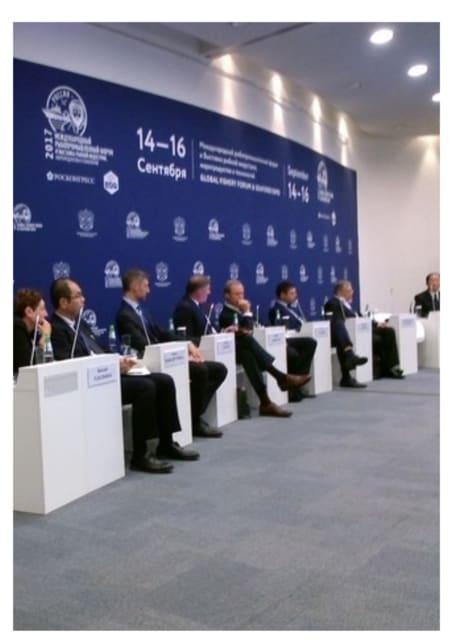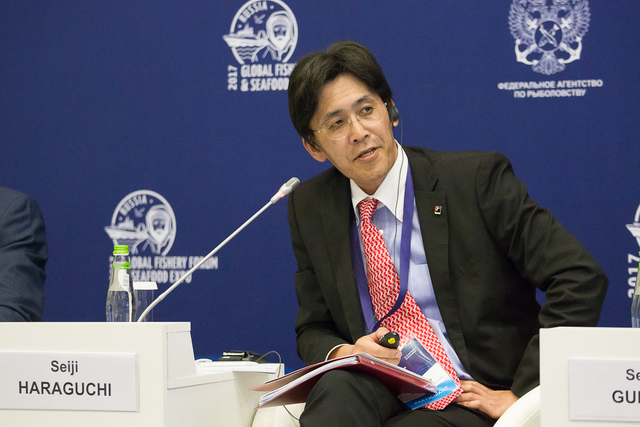Trump Moves to Widen U.S. Sanctions on North Korea
By PETER BAKER and SOMINI SENGUPTA SEPT. 21, 2017
President Trump ordered a widening of American sanctions on North Korea on Thursday to further choke off its trade with the outside world, in what some experts described as perhaps the most sweeping set of punitive economic measures enacted by the United States in many years.
A new executive order signed by Mr. Trump aimed to cut North Korea out of the international banking system while targeting its major industries and shipping. The move suggested that for now, at least, the president was still committed to applying economic pressure rather than military action, despite his vow this week to “totally destroy North Korea” if the United States were forced to defend itself or its allies.
“North Korea’s nuclear weapons and nuclear development is a grave threat to peace and security in our world, and it is unacceptable that others financially support this criminal, rogue regime,” Mr. Trump said as he hosted President Moon Jae-in of South Korea and Prime Minister Shinzo Abe of Japan for lunch in New York. “The brutal North Korean regime does not respect its own citizens or the sovereignty of other nations.”
The action came amid news reports that China’s central bank had instructed the country’s banks not to do new business with North Korea and to wind down old loans, in keeping with United Nations sanctions. As North Korea’s dominant economic partner, China holds the most sway with Pyongyang, but it remained unclear if its latest action would be enforced enough to have any real impact.
For all of the headline-grabbing pugnacity of Mr. Trump’s United Nations speech earlier this week, in which he mocked North Korea’s leader, Kim Jong-un, as “Rocket Man” on a “suicide mission,” the president made it clear on Thursday that he was still open to negotiations. Asked by a reporter whether dialogue was still possible, he said, “Why not?”
Mr. Kim, however, signaled no such openness. In a statement, he denounced Mr. Trump as a “rogue and gangster fond of playing with fire” and said that rather than deter him, Mr. Trump’s speech had convinced him that “the path I chose is correct and that it is the one I have to follow to the last.” He vowed retribution: “I will surely and definitely tame the mentally deranged U.S. dotard with fire.”
Mr. Kim on Friday vowed the “highest level of hard-line countermeasure,” in response to Mr. Trump’s speech. Asked by reporters in New York what the North Korean might intend, his foreign minister, Ri Yong-ho said that he thought the North might be considering the largest test of a hydrogen bomb ever in the Pacific Ocean, according to the South Korean news agency Yonhap.
North Korea has already raised the temperature in the region by testing a nuclear bomb and intercontinental ballistic missiles in recent weeks.
But it has withstood an array of American and international sanctions for years, and it remains unclear whether the latest round will have any greater effect. Just last week, the United Nations Security Council approved an American-drafted resolution tightening limits on North Korean trade, although it did not go as far as the Trump administration wanted.
Some critics of Mr. Trump praised him on Thursday for focusing on diplomatic pressure rather than saber rattling. R. Nicholas Burns, a former undersecretary of state under President George W. Bush, said the new American sanctions were “a smart move” because the latest United Nations resolution was insufficient.
“The U.S. sanctions will help to raise the cost to North Korea of its nuclear weapons buildup,” said Mr. Burns, who now teaches at Harvard. Referring to the United Nations Security Council, he added: “The Bush and Obama administrations pursued a similar path on Iran sanctions — both U.N.S.C. and American unilateral sanctions — which proved effective.”
David S. Cohen, who directed sanctions for President Barack Obama at the Treasury Department, was impressed. “I think it is reasonably significant,” said Mr. Cohen, who now works on sanctions issues at the law firm of Wilmer Hale. “These sanctions combine the sectoral sanctions we used against Russia with the effort to shut down banking relationships we used with Iran.”
Mr. Trump’s order in some ways went even beyond the sanctions that ultimately brought Iran to the bargaining table during Mr. Obama’s administration. It bars international banks from the American market if they facilitate transactions with North Korea, targeting not just what are called correspondent accounts as the Iran measures did but blocking all assets in the United States held by such a bank.
It also punished those doing business with major North Korean industries including textiles, fishing, information technology and manufacturing and imposed a 180-day ban on foreign-owned aircraft and ships entering the United States after leaving North Korea.
But while in some ways they went beyond the Iran sanctions, they may not have as much impact since North Korea is less reliant on the international banking system. The North has proved adept at evading sanctions and Pyongyang may have already moved more of its transactions to cash or barter.
Nikki R. Haley, the American ambassador to the United Nations, acknowledged that even ratcheted-up measures were unlikely to change Mr. Kim’s behavior.
“We always knew that the sanctions may not work,” she said. “What the goal of the sanctions was always intended to be is to cut the revenue so they could do less of their reckless behavior.”
For the Trump administration, though, even failed sanctions will help make the case to China and others that at least it tried.
The new sanctions came as Mr. Trump, Mr. Moon and Mr. Abe presented a show of solidarity. The most important regional player, however, was not in New York: President Xi Jinping of China. He skipped this year’s United Nations session.
But Mr. Trump spent an hour on the telephone with him earlier in the week. Treasury Secretary Steven Mnuchin called China’s central banker in advance of Thursday’s executive order and later told reporters that the American measures were not targeted in particular at Beijing.
China’s top diplomat, Wang Yi, sought on Thursday to cast Beijing as a mediator, calling on Pyongyang to abandon its nuclear weapons program and on Washington to compromise. “Negotiation is the only way out, which deserves every effort,” he said. “Parties should meet each other halfway by addressing each other’s legitimate concerns.”
The meetings with Mr. Abe and Mr. Moon came on the fourth and final day of Mr. Trump’s visit to New York for the annual session of the United Nations General Assembly. In addition to his Asian guests, Mr. Trump hosted separate meetings with President Ashraf Ghani of Afghanistan, Petro O. Poroshenko of Ukraine and Recep Tayyip Erdogan of Turkey.
Mr. Abe, who has been largely aligned with Mr. Trump’s approach, offered words of support. “Dialogue for the sake of dialogue would not produce anything,” Mr. Abe said after meeting with the president. “The key at this moment is to exercise and apply pressure against North Korea in a robust manner. And together with Donald, we’ve been successfully demonstrating our strong will to exercise pressure against North Korea.”
Mr. Moon has been the odd man out of the three, arguing for more engagement and opposing any military action. Mr. Trump has derided this approach, calling it “appeasement,” but no mention was made of that on Thursday.
“North Korea has continued to make provocations, and this is extremely deplorable and this has angered both me and our people,” Mr. Moon said. “But the United States has responded firmly and in a very good way.”
He told Mr. Trump: “You made a very strong speech, and I believe the strength of your speech will also help to change North Korea.”
Still, earlier in the day, Mr. Moon used his own address to the General Assembly to urge world leaders to “peacefully solve the North Korea nuclear issue,” step up diplomatic pressure and do everything possible to prevent war on the Korean Peninsula.
2017年09月23日
朝鮮日報
[北朝鮮危機:米国がセカンダリー・ボイコットを全面施行へ]
米国のドナルド・トランプ大統領は21日(現地時間)、北朝鮮と貿易および金融取引を行う第三国の個人や機関を制裁できる「セカンダリー・ボイコット」を全面施行する行政命令に署名した。核・ミサイル挑発を強行する北朝鮮を圧迫するため、中国・ロシアとの正面衝突も甘受するという意味だ。先に米国は2015年まで、イランについてセカンダリー・ボイコットを施行していた。
トランプ大統領は21日、ニューヨークで開かれた韓米日首脳会議で「今回の行政命令は、北朝鮮と商品・サービス・技術を取引する機関や個人を狙ったもの。外国金融機関は、北朝鮮と取引するのか、さもなくば米国と取引するのか、はっきり選択すべき」「新しい行政命令は、致命的な(核)兵器を開発しようとする北朝鮮の収益の源泉を断つだろう。(北朝鮮に対する)寛容は今こそ終わるべきだ」と語った。
また22日にトランプ大統領は、米国に向け「史上最高の超強硬対応措置を取る」と公言した北朝鮮の金正恩(キム・ジョンウン)労働党委員長を「いかれたやつ(mad man)」と強く非難した。トランプ大統領はこの日、ツイッターに「金正恩は、自分のところの住民を飢え死にさせることもためらわない、明らかにいかれたやつ。彼はかつてない試練にさらされるだろう」と書き込んだ。
今回の行政命令は、北朝鮮との重要な貿易取引に関連する外国金融機関を、米国政府が制裁できるようにした。北朝鮮と取引する金融機関をドル取引から排除し、国際金融市場から退場させるのだ。また北朝鮮の港や空港に出入りした船舶・飛行機は、米国への入港・着陸が180日間禁止される。さらに、北朝鮮の建設・エネルギー・漁業・情報技術(IT)・医療・鉱業・繊維・運送産業と関連がある機関・個人を制裁する内容も盛り込まれた。




































